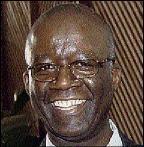
Hibbert
The police have introduced an amnesty for motorists in the Corporate Area, for whom outstanding warrants are in the system for various traffic offences.
Head of the traffic division, Superintendent Fred Hibbert said that the Traffic headquarters in Kingston has over 70,000 outstanding warrants for motorists in the Corporate Area.
"We would like to have them reduced significantly, so what we have done is introduced an amnesty where motorists can now voluntarily call in if they have outstanding warrants and what we will do is walk with them to the court, rather than have them arrested," Mr Hibbert explained.
According to the traffic chief, the amnesty will continue for an unspecified period of time.
Avoid embarrassment
Mr Hibbert is encouraging motorists to make use of the amnesty and avoid being embarrassed.
"There is no need for persons to be arrested on the roads, because if they volunteer, we will work with them, but if they are caught otherwise, then we will arrest them. If they come forward, we will deal with the warrants in a way that is amicable to all the parties involved," the superintendent said.
He explained that the offences leading up to these warrants vary, but they include disobeying the Road Traffic Act, driving under the influence of alcohol, driving without a driver's licence and registration plate, and without certificates of fitness.
Mr Hibbert said there is a difficulty in determining the total number of warrants recorded islandwide. "We are trying to get the office properly computerised, so we can actually bring in all the other warrants, but we haven't got the computers and data processors yet. Once that is done, we will have a greater say as to the total number of warrants we have," he added.
The superintendent said even though the traffic division is under-resourced, they would use a number of strategies to make drivers desist from committing offences.
Maximising resources
"We don't have enough people to do some of the things on the road, so we are maximising our resources by pulling people from different divisions and putting them together in large groups where we try to have a campaign for a couple of days out of the week to deal with the offences," he said.
"Anything that we do to reduce deaths and collision on the roads has an impact, so we have increased the number of speed traps we set on the roads," Mr Hibbert added.

